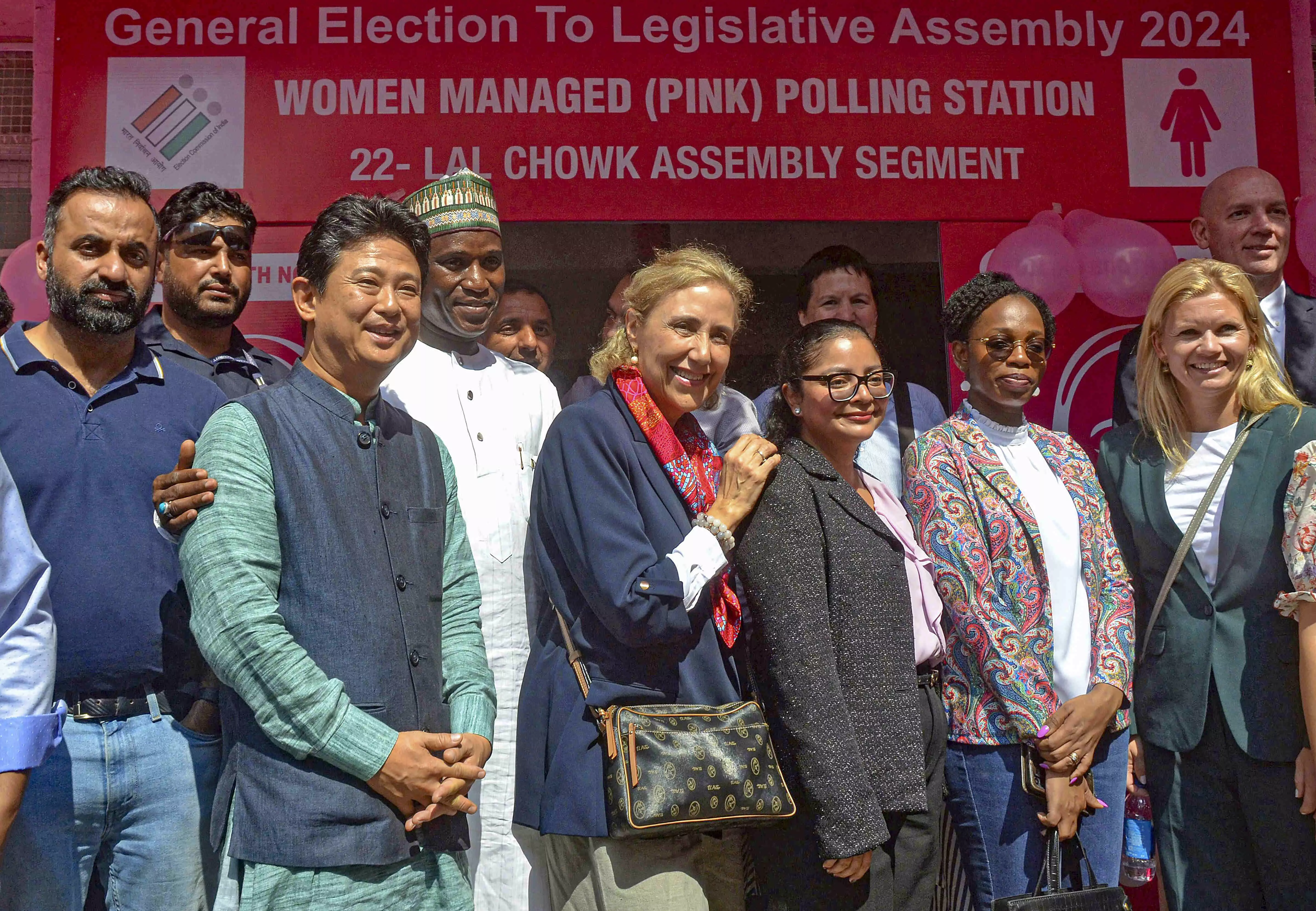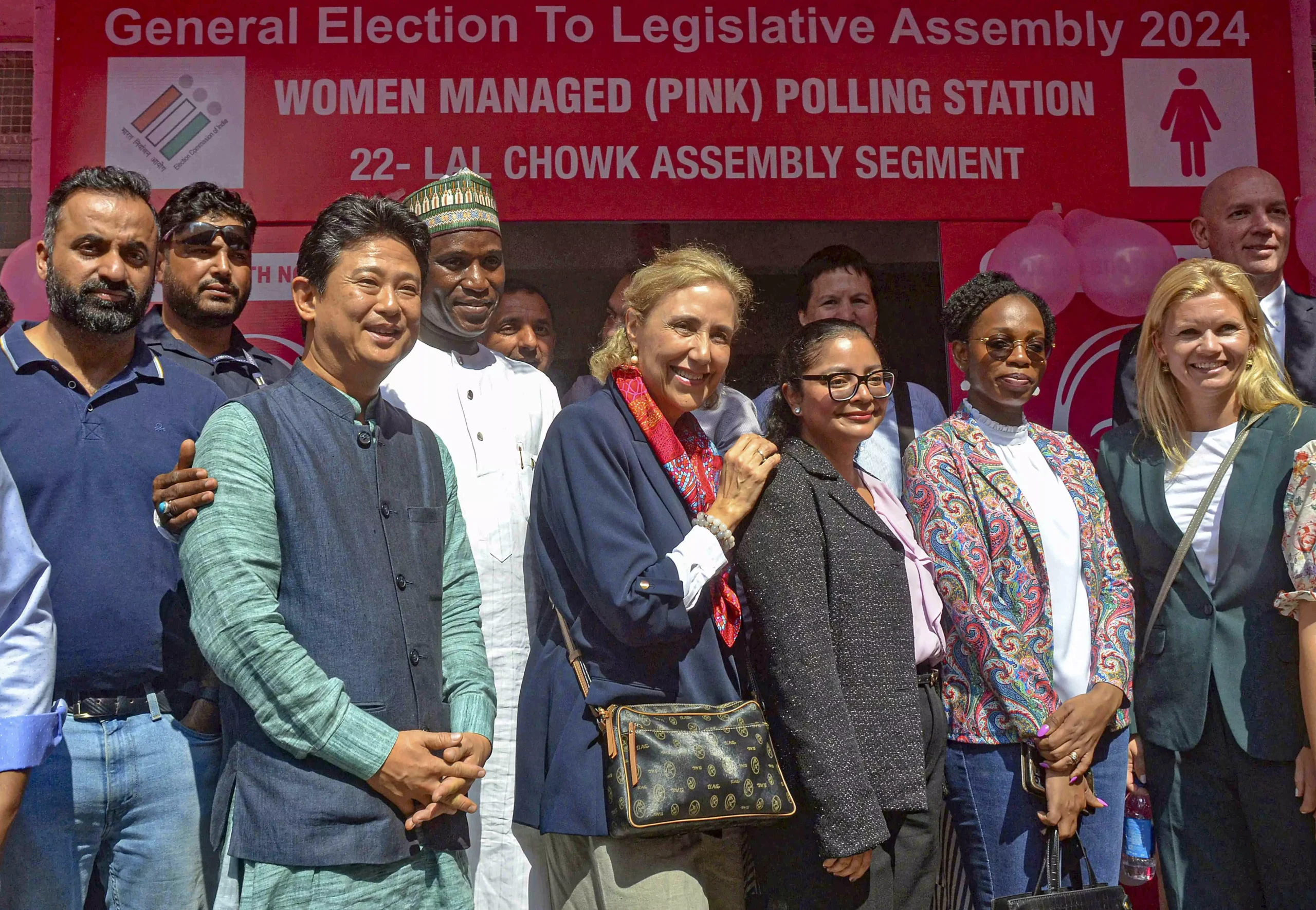
The delegation includes Charge d’affaires, deputy chiefs or other officials of the missions in India of the USA, Mexico, Guyana, South Korea, Somalia, Panama, Singapore, Nigeria, Spain, South Africa, Norway, Tanzania, Rwanda, Algeria, and Philippines. The official sources said that the foreign diplomats are visiting Srinagar at the invitation of the Ministry of External Affairs (MEA).
One of the diplomats Alice Chain from Singapore said, “The purpose of visiting Srinagar today is to observe polling and to see how democracy is working on the ground.” She added, “It looks a lot more festive here than we normally see on a polling day in Singapore”.
South Africa’s Lara Swart said that it was for the first time that she is visiting J&K and that too on a polling day. “I’m happy to be here and see how people are voting. It is really a privilege to be invited by the MEA to come and visit the polling stations.”
Former chief minister and National Conference (NC) leader Omar Abdullah, however, called the visiting foreign diplomats as “guided tourists.” While speaking to reporters after casting his vote at a polling station set up at Srinagar’s Burn Hall School, Mr. Abdullah asked, “If diplomats can be brought here, why are foreign journalists not being permitted to come here and cover elections. The diplomats who are in Srinagar today have been brought here as guided tourists.”
He questioned the wisdom behind inviting foreign diplomats to observe the polling in J&K. “I don’t know why foreigners should be asked to check elections here. When foreign governments comment, then the government of India says, ‘this is an internal matter for India’, and now suddenly they want foreign observers to come and look at our elections,” he said. He added that elections “are an internal matter for us and we do not need their certificate”.
The polling in being held under tight security with thousands of well-equipped security personnel of the J&K police, the Central Armed Police Forces (CAPFs) Border Security Force (BSF) and Seema Shastra Bal (SSB) deployed at and outside the polling stations and at other vulnerable places to ensure peace. Officials said that more than 1,3000 polling staff took positions at 3,502 polling stations hours before the start of voting.
The opposition has alleged that the police detained thousands of people, particularly youth ahead of the elections. Former chief minister Mr. Abdullah said, “They have used all the machinery of the government to detain and harass people. Despite it, people are coming and participating in the elections. So, this is not something the Government of India should be highlighting (by inviting foreign diplomats). But, anyway, that’s the way they are.”
However, the J&K police asserted, “Only few mischievous elements with past conduct and proclivity of disrupting electoral process and having criminal antecedents are being dealt with and bound down under preventive sections of law following due procedure of law.” It added, “The preventive sections of law provide law enforcement agencies security for keeping peace and good behaviour. Legal measures duly reported are adhered to ensure free and fair electoral process.”
In this phase, over 25.78 lakh voters are deciding the fate of 239 candidates including Mr. Abdullah, the JKPCC chief Tariq Hameed Karra and his counterpart at the BJP’s state unit Ravinder Raina. While Mr. Abdullah is seeking election simultaneously from family turf Ganderbal and Budgam -both in the Kashmir Valley, Mr. Raina is hoping to retain the Nowshera seat in the frontier Rajouri district which he won in the 2014. Mr. Karra is fighting for Srinagar’s Shalteng seat as a candidate of the NC-Congress combine.
The other prominent faces in the fray are former ministers Syed Altaf Bukhari, Ali Muhammad Sagar, Abdul Rahim Rather, Asiea Naqash, Choudhary Zulfikar Ali and Syed Mushtaq Bukhari, former Speaker of the erstwhile J&K state Assembly Mubarak Gul and former Mayors of
The Election Commission of India (ECI) here said that the second phase of polling covers 26 segments across Srinagar, Ganderbal and Budgam districts in the Kashmir Valley and Reasi, Rajouri and Poonch districts in the Jammu region. In the Valley, the seats up for voting are Kangan, Ganderbal, Hazratbal, Khanyar, Habba Kadal, Lal Chowk, Channapora, Zadibal, Eidgah, Shalteng, Budgam, Beerwah, Khansahib, Chrar-i-Sharief and Chadoora in the Valley and Gulabgarh, Reasi, Shri Mata Vaishno Devi, Kalakote- Sunderbani, Nowshera, Rajouri, Budhal, Thannamandi, Surankote, Poonch Haveli and Mehdhar in the Jammu region.
Among the 25,78,099 registered voters are 13,12,730 male, 12,65,316 female and 53 third-gender voters. Those eligible to use their democratic right include 120, 612 first-time voters in the 18-19 age group, the officials said. Kangan, Gulabgarh, Rajouri Budhal, Thannamandi, Surankote and Mendhar segments having sizable Gujjar, Bakarwal and Pahari populations are reserved Scheduled Tribe (ST) seats.
The ECI said that all the polling stations are equipped with a 100 percent webcasting facility.
